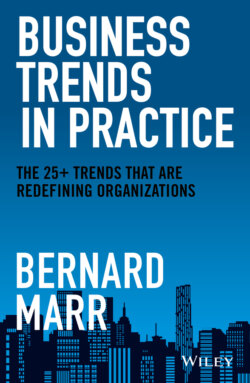Читать книгу Business Trends in Practice - Бернард Марр, Bernard Marr - Страница 11
Trend 2: Shifts in Economic and Political Power
ОглавлениеThe economic and political world order is changing and, by 2050, the list of the most economically and politically powerful countries in the world will look very different to today.
Take China as an example. Due to the impact of the coronavirus crisis, China's economy is now predicted to overtake the United States by 2028, five years earlier than previously thought.9 China is one of the so-called E7 emerging countries – alongside India, Brazil, Mexico, Russia, Indonesia, and Turkey – countries whose economies are expected to exceed those of the G7 advanced economies.
Let's look at a few stats that highlight the startling shifts in power that are coming our way:10
By 2050, the EU27's share of global GDP will be just 9 percent, while China's is expected to be 20 percent.
BY 2050, India will rank second in the global GDP rankings, putting it behind China and ahead of the US. Indonesia will rank fourth. The UK could be down to 10th place.
E7 economies could grow around twice as fast as the G7. In fact, the combined economic power of the E7 economies could be double that of the G7 by 2040 – that's from being the same size as the G7 in 2015 and half the size in 1995.
And then there are the “next 11” emerging economies, including Bangladesh, Egypt, Nigeria, Pakistan, and Vietnam. These economies are projected to overtake the EU27 in global power as early as 2030.11
Bottom line, the West has been on the rise for centuries, but that is about to change. The E7 and next 11 economies will increasingly hold more sway in the global economy and, in turn, in world politics. Earlier in this chapter, I mentioned that China is building close links with African nations for access to land and rare resources, and this is just one example of China extending its global influence.
This power shift will no doubt bring new tensions, particularly as the world's most precious resources become scarcer. We may also see a new Cold War emerge around technology. China has said it wants to be a world leader in artificial intelligence by 2030, and has introduced measures to control the export of AI technologies by Chinese companies.12 President Trump's ban on Huawei's products and telecoms equipment gives us another glimpse of how countries may seek to restrict the technological capabilities of other countries. In other words, rather than bringing the world closer together, technology may be yet another thing that exacerbates global tensions and contributes to growing divergence.
